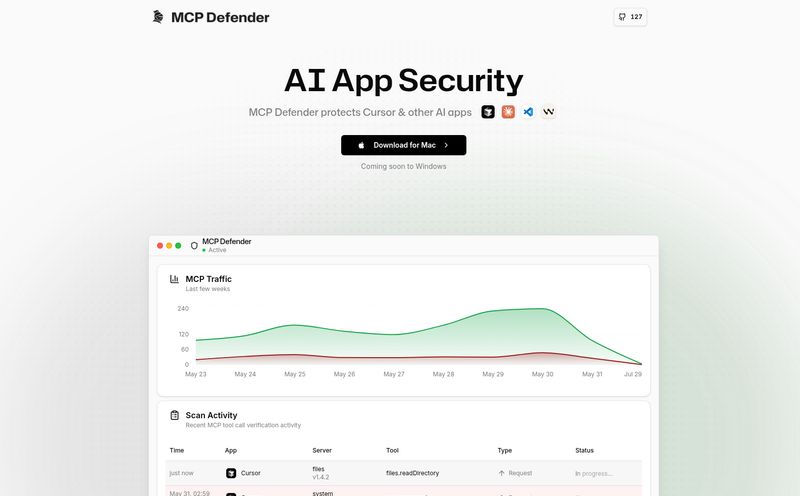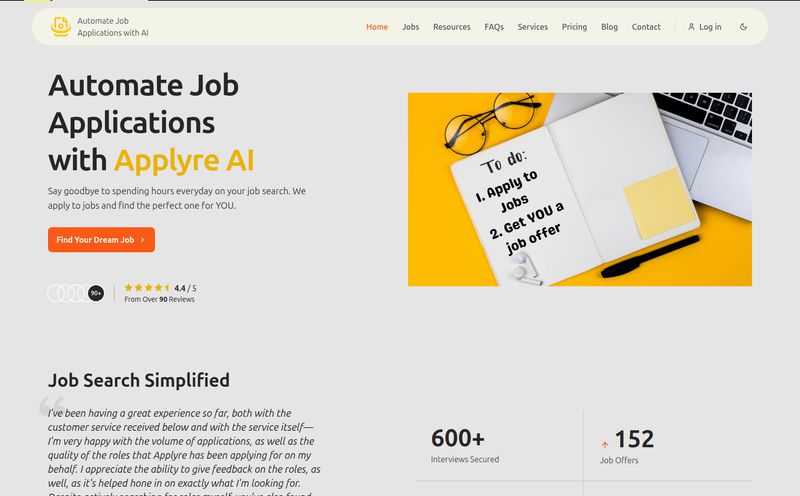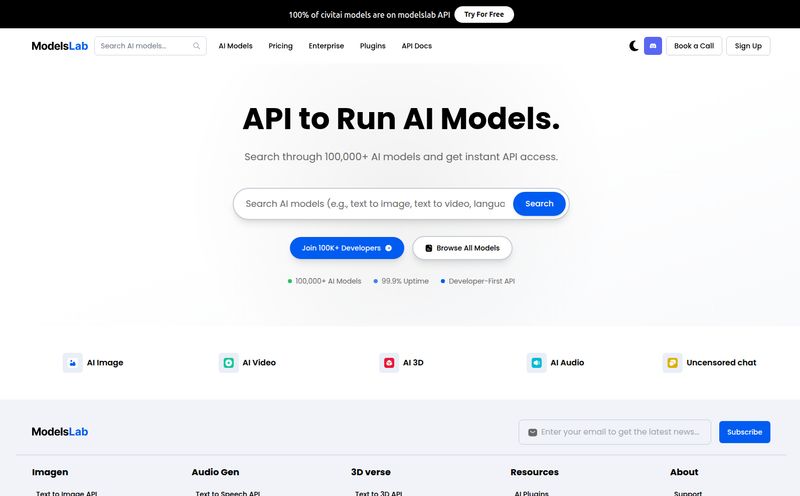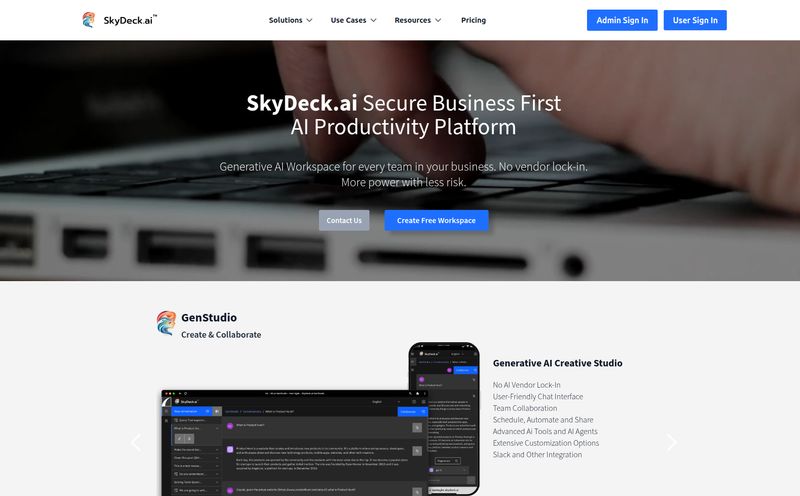Another day, another AI tool. Seriously. Just when you think you've seen every possible wrapper for an LLM, something new pops up on your feed, promising to be the next big thing. I’ve been in the SEO and digital marketing game long enough to see trends come and go, and right now, the AI gold rush is in full swing. So when I stumbled upon something called "Coogle AI," I have to admit, my first reaction was an eye-roll. Followed immediately by curiosity.
The name itself is... bold. It’s got guts, you have to give it that. But what really caught my attention was the tagline right under its logo: "Make AI Search Affordable For Everyone, Everywhere." And then, the search bar placeholder: "phind ai cheap alternative."
Okay, now you're speaking my language. As much as I admire powerful tools like Perplexity and Phind, their pro plans can add up, especially if you're a freelancer or part of a small team. The promise of a budget-friendly, powerful AI search engine is enough to make even a jaded old SEO pro like me sit up and pay attention.
What Exactly is Coogle AI? (And No, It's Not from Google)
Let's get the obvious out of the way. Despite the name, this has nothing to do with Google. Not officially, anyway. Coogle AI presents itself as a lean, mean, AI-powered search machine, specifically targeting users who might be looking for a more affordable alternative to established players in the AI search space. Phind, in particular, seems to be the giant they have in their sights.
Phind has carved out a fantastic niche for itself, especially among developers, for providing concise, code-aware answers. It's good. Really good. But "good" often comes with a price tag. Coogle AI seems to be betting that there's a huge market of users who want 90% of that power for a fraction of the cost. A classic disruptor move.
The interface I saw was incredibly simple. Clean, no frills, just a search bar and a dropdown to select your AI model. It’s a tool built for a purpose, not to win design awards. And honestly? I kind of respect that.

Visit Phind AI
A Peek Under the Hood: The Choice of AI Models
This is where things get interesting. One of the biggest selling points for any new AI tool is the engine it's running on. Coogle AI isn't just a one-trick pony; it offers a selection of different models. This is a massive plus in my book. Sometimes you need a quick, cheap answer, and other times you need a deep, nuanced explanation. Giving the user that choice is smart.
Based on the interface and some digging, here’s a look at the brainpower Coogle AI offers:
- Mistral Entry: Think of this as your daily driver. It's likely fast, efficient, and perfect for the majority of general queries. The fact that this seems to be the default or free option is a great starting point.
- Llama Expert (Pro): Meta's Llama models are known for their strong reasoning capabilities. This is probably the model you switch to when you need to work through a complex problem or get more detailed, technical answers.
- Qwen Advanced & Summit (Pro): Developed by Alibaba Cloud, the Qwen models are powerhouses, especially with multilingual tasks and complex coding. Having access to these would be a significant advantage for a global user base or developers working with diverse codebases.
- Mixtral Synthesis (Pro): From the makers of Mistral, Mixtral uses a Mixture-of-Experts (MoE) architecture. In layman's terms, it's designed to be incredibly efficient—providing top-tier performance without the insane computational cost. It’s the smart choice for high-quality, fast results.
This multi-model approach is something I wish more platforms would adopt so openly. It turns the tool from a simple search engine into a versatile AI toolkit.
Coogle AI vs. Phind: The David and Goliath Story?
So, can this newcomer really take on an established favorite like Phind? Maybe. It's less about a knockout punch and more about finding a different audience.
Phind has built a reputation and a loyal following. It's polished. It has features like 'Pair Programmer' that are deeply integrated into a developer's workflow. Coogle AI, from the looks of it, is the scrappy underdog. Its main weapon is affordability. When I tried to find a pricing page, I hit a 404 error—a classic sign of a product that's still very much in development. But if they stick to their "affordable" promise, I'd expect a generous free tier powered by Mistral and a pro plan that significantly undercuts the ~$20/month fee of its competitors. If they can price it around the $10 mark, they could have a real winner.
The trade-off? You might not get all the bells and whistles. The performance might be a hair slower on some models. The UI might remain basic. But for many people, especially students, hobbyists, and developers watching their budget, that’s a trade-off they’re more than willing to make.
My Hands-On Experience (The Good, The Bad, and The... Intriguing)
Jumping in and running a few queries, the experience was... clean. I started with a simple dev question: "enable scss in next.js 14". Using the Mistral Entry model, the answer was fast and accurate. It gave me the necessary steps and a code snippet. No complaints there.
The good is the simplicity. There’s no learning curve. You type, you get an answer. It's a tool that gets out of your way.
The bad? Well, its probably more 'the unpolished'. The 404 on the pricing page is one thing. The overall feel is that of a beta product. It works, but it lacks the reassuring polish of a mature platform. You feel like you're on the ground floor, which can be exciting but also a little wobbly. I'm not sure I'd bet a critical project deadline on it just yet.
But the intriguing part is the potential. If this team can keep the service stable, deliver on that affordable price point, and continue offering access to top-tier models, Coogle AI could become an indispensable tool in the developer's arsenal. It's one to watch, for sure.
A Quick Thought on That Name
We have to talk about the name again. Coogle AI. It’s a head-turner. It's also riding a fine line, legally speaking, I'd imagine. As an SEO guy, my first thought was, "How are people ever going to find this without getting a million results for Google's own AI?" It might be a clever, short-term gimmick to get attention, but it could be a long-term branding headache. Still, in a sea of bland, forgettable AI names, it definitely makes you look twice.
So, Should You Give Coogle AI a Try?
If you're constantly bumping up against the free limits of other AI search tools or if you're just plain curious, then absolutely. There's no reason not to. It feels like a platform built by users, for users, with a focus on practical application rather than corporate gloss.
It's not going to replace your specialized, high-end AI assistants tomorrow. But as a powerful, flexible, and hopefully cheap tool for getting quick, reliable answers from a range of excellent AI models? It has my vote. It’s a bit rough around the edges, but so was every great tool at the beginning. I, for one, am rooting for the underdog.
Frequently Asked Questions about Coogle AI
What is Coogle AI?
- Coogle AI is an AI-powered search engine positioned as an affordable alternative to other platforms like Phind AI. It provides users with access to multiple Large Language Models (LLMs) to answer technical and general queries.
How is Coogle AI different from Phind?
- The primary differentiator appears to be cost. Coogle AI markets itself as a "cheap alternative," suggesting its main goal is to provide similar multi-model AI search capabilities at a lower price point than established services like Phind.
Is Coogle AI free to use?
- While a final pricing model isn't public yet, the platform appears to have a free tier, likely using the "Mistral Entry" model. Pro features, which include more powerful models like Llama and Qwen, will almost certainly require a paid subscription.
What AI models does Coogle AI use?
- Coogle AI offers a range of models, including Mistral Entry, Llama Expert, Qwen Advanced, Qwen Summit, and Mixtral Synthesis, allowing users to choose the best model for their specific task.
Is Coogle AI related to Google?
- No. Despite the similar-sounding name, there is no official connection between Coogle AI and Google. The name seems to be a playful marketing choice.
Who should use Coogle AI?
- It's ideal for developers, students, researchers, and AI enthusiasts who want access to powerful AI search and different models without a high subscription fee. It's a great choice for those on a budget or anyone looking for a straightforward, no-frills tool.
Reference and Sources
- Phind Official Website - The primary competitor mentioned by Coogle AI.
- Mistral AI - Information on the Mistral and Mixtral models.
- Meta AI - For more on the Llama family of models.



